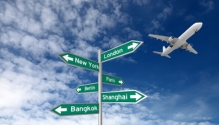The Digital Backbone
Elevating experiences and optimising operations—how data is transforming the travel and hospitality industry, says Harish Chandra, Founder of GHTP-Global Hospitality Technology Professionals.
By Harish Chandra
In today's digitally driven world, the travel and hospitality sector stands at the cusp of a profound evolution, fuelled by the intelligent application of data. Beyond mere operational efficiency, data-driven strategies are now the cornerstone of exceptional guest experiences and optimised business models. For hotels, airlines, and travel agencies alike, embracing these technologies is no longer optional—it's the key to unlocking unprecedented growth and fostering lasting customer loyalty.

Understanding the fuel: What exactly is data?
At its core, data comprises the raw, unorganised facts and figures generated daily. Within our industry, this encompasses a rich tapestry of information, including guest preferences (from dietary restrictions to preferred pillow types), booking histories, website interactions, social media sentiment, loyalty program activity, and even operational metrics such as room occupancy rates and energy consumption. When this raw data is meticulously processed and intelligently analysed, it transforms into invaluable insights, capable of reshaping every facet of how we operate and interact with our guests.
Laying the digital foundation: The imperative of digitisation
The initial yet crucial step in harnessing the power of data is digitisation: the conversion of traditional, often paper-based information into digital formats. Imagine a hotel transitioning from handwritten guest folios to a comprehensive property management system (PMS). This fundamental shift enables seamless access to information, accelerates data processing, and provides a secure repository, forming the bedrock upon which more sophisticated digital strategies can be built.
Streamlining operations and enhancing experiences through digitalisation
Building upon digitisation, digitalisation involves leveraging digital technologies to automate and refine existing processes. Consider how loyalty programmes of hotel chains like Marriott Bonvoy have implemented mobile check-in and keyless entry. This not only streamlines the arrival experience for guests, eliminating queues and manual paperwork but also enhances operational efficiency by freeing up front desk staff. Similarly, automated booking confirmations and real-time flight updates offered by airlines demonstrate how digitalisation elevates efficiency and customer satisfaction by replacing cumbersome manual workflows.
Uncovering hidden gems: The art of data modelling and analysis
With a multitude of diverse data streams—ranging from online reviews on platforms like TripAdvisor to real-time data from in-room sensors monitoring temperature and usage—data modelling becomes paramount. This involves structuring disparate data points to identify meaningful relationships and patterns. Subsequently, data analysis takes centre stage, examining and transforming this structured information into actionable intelligence.
For instance, analysing booking patterns allows hotel groups like Hilton to dynamically adjust room pricing based on anticipated demand, maximising revenue. Furthermore, by analysing guest feedback and preferences, they can tailor personalised offers and promotions, enhancing the likelihood of repeat bookings.
Gaining a competitive edge: The power of data analytics
Data analytics extends beyond understanding past trends; it empowers businesses to predict future behaviour and gain a significant competitive advantage. Identifying peak booking periods for specific destinations or understanding the preferred amenities of different guest segments allows for strategic resource allocation and highly targeted marketing campaigns.
For example, IHG Hotels & Resorts might analyse data to identify a surge in family bookings during school holidays in a particular region, enabling them to create tailored family-friendly packages and allocate resources accordingly. This proactive approach ensures businesses remain agile and ahead of their competitors.
Transforming the guest journey: Digital transformation in action
Digital transformation represents the holistic integration of digital technologies across all business functions, fundamentally reimagining the guest journey. In the travel and hospitality sector, this manifests in various innovative ways. Think of AI-powered chatbots providing instant customer support and personalised recommendations, as seen on the Accor ALL app.
Personalised recommendation engines suggest local experiences or dining options based on a guest's past behaviour. Innovative room technologies, allowing guests to control lighting, temperature, and entertainment via voice commands or mobile apps, further enhance the in-stay experience. Digital transformation is about leveraging technology to deliver unparalleled value at every touchpoint, creating memorable and seamless experiences that foster loyalty.
Building trust and ensuring security: Data governance and protection
Handling vast amounts of sensitive guest data requires robust data governance frameworks. This involves establishing clear policies and procedures to manage data quality, security, and regulatory compliance, such as GDPR or CCPA. Simultaneously, stringent data protection measures are crucial to ensure it is safeguarded using fundamental principles: lawfulness, transparency, accountability, integrity, and confidentiality. Hotel chains invest heavily in secure data infrastructure and employee training to maintain guest trust and avoid costly data breaches, recognising that data security is paramount to their reputation and long-term success.
By embracing the power of data, the travel and hospitality industries are not just adapting to the digital age; they are actively shaping its future. From personalised guest experiences to optimised operational efficiency, data-driven insights are paving the way for a new era of innovation and customer-centricity, ultimately leading to greater profitability and lasting relationships with guests.


























